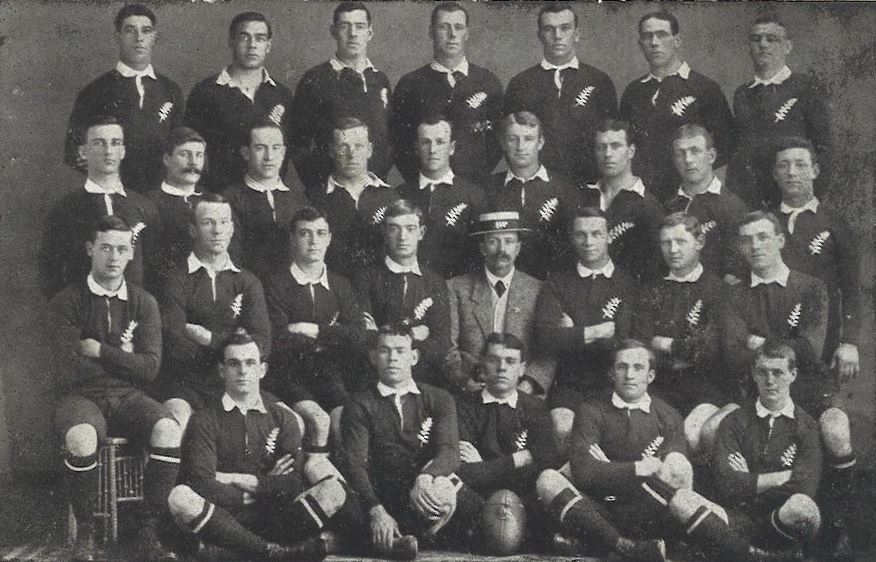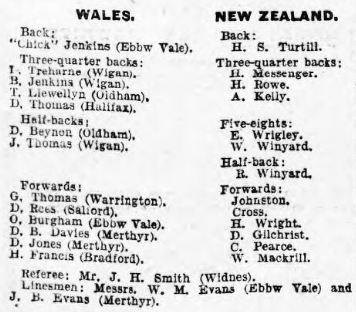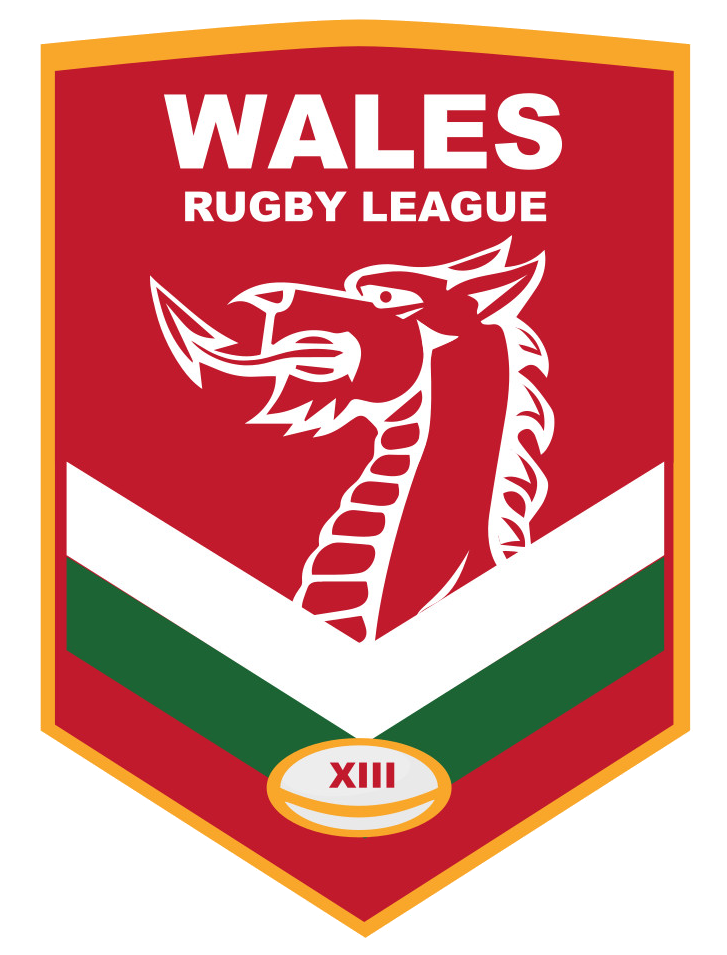1907/1908 New Zealand Tour of UK

Wales
01 January 1908 • KO 14:30
9 v 8
Athletic Ground, Aberdare
Attendance: 15000
Referee : JH Smith

New Zealand
| 3 | Tries | 2 | ||
|---|---|---|---|---|
| 0 | Conversions | 1 | ||
| 0 | Penalties | 0 | ||
| 0 | Drop Goals | 0 |
Match Report
New Zealand

N.U. INTERNATIONAL
New Zealand Beaten by a Point
HUGE CROWD AT ABERDARE [By PEN DRAGON]
Evening Express - 1st January 1908 (Pink Edition)
There was no doubt about the intense interest taken in the hill districts of South Wales in the Wales v. New Zealand professional Rugby match played on the Athletic Grounds, Aberdare, this afternoon. An hour before the match there were between 2,000 and 3,000 spectators present, and from that point on people poured in rapidly. The period of waiting was pleasantly whiled away by the Aberdare Town Band. under the conductorship of Mr. Manley.
It was a disagreeable surprise to myself upon arriving at the ground to find the turf was hard, despite the liberal application of rock salt, There were patches of the field which were as hard as adamant, and outside the touch-line the turf, almost entirely around the field, was quite frozen. If I had been asked to determine the matter I should certainly have declared the ground unplayable, Although the sun at times shone brightly, it was freezing all day in the shade, and the tendency was for the ground to get harder instead of softer.
That the field was not suitable for a big match was early made manifest, for half an hour before play commenced the crowd on the grand stand side invaded the ground and crowded in front of the press table to such an extent that there was little prospect of the reporters seeing the game. However, Mr. Baskerville, the New Zealand manager, came to the rescue, and had the long table shifted on to the turf bordering the touch-line. Still, the task of the police, under the careful charge of Inspector Nott, in keeping the crowd under control was not an enviable one. However, the genial inspector and his men worked very hard, and there was every prospect of their succeeding. Just a minute before the commencement there were 10,000 present, and a tendency to increase to nearly 15,000 when the teams entered the field at 2.30. The sides lined up in this order:-

The Welsh Captain
It was announced that Tom Llewellyn, of Whitchurch (whose record appears on Page 4) had been elected, captain oi the Welsh team. The band played "Hen Wlad fy Nhadau," and the New Zealanders, who were heartily cheered on taking the field, gave their famous war dance.
THE GAME
The Welshmen started against the sun, and Johnnie Thomas put them on the attack with a clever kick, the ball bouncing into touch. Play in the opening ten minutes went in favour of Wales, and both Treharne and Dai Thomas came within an ace of scoring. A mull by Beynon at the centre allowed the New Zealanders' forwards to dribble away, and Messenger, picking the bad up near the line, was only pushed into touch a yard out. The Welshmen returned to the attack, and Beynon, breaking away prettily, sent several 0f the forwards off with only a couple of men to beat, but they were not enough, and the last man to receive was pulled down from behind. Another attack on the by Wales saw Treharne going over, but he was called back for stepping into touch. The ground was so hard that already a couple of tile New Zealanders were laid. out. and after a run by Messenger the latter Parsed to Rowe. the clever centre, who was thrown heavily, and had to leave the field with an injured knee. The attack, however, was continued by the Colonials, and, following good passing, Kelly ran over in the right-hand corner. Turtill failed to convert. In a few minutes Wales were at the other end attacking hotly, and Beynon initiated a round of passing, which ended in the ball going across to Dai Thomas, who ran around with a good try, which G. Thomas failed to augment. This success by Wales evoked enthusiastic cheering. A lot of exciting work followed, but the play was not very pretty. Johnny Thomas (late of Maesteg) slipped away on the blind side, and made a brilliant run, but was not fast enough to beat the defence. W. Johnston, one of the New Zealand forwards, was tackled by Geo. Thomas. and was laid out for a few minutes, whilst W. Winyard was bleeding freely from a cut on the back of the head, sustained early in the match. However, this did not prevent him running in with a good try when he was given a long pass out. Turtill converted. Play continued to be fairly even, but the Welshmen certainly passed the cleverer, although their handling was not so varied as that of their opponents. Taking the ball from a free kick, Tom Llewellyn i niade a brave run through the New Zealanders, and was only stopped a yard from I the line, when he kicked the ball, and a Welsh forward appeared to get over, but was recalled.
Quarter-time: G. T. Pt's. New Zealand 0 1 3 Wales 0 1 3. Half-time: G. T. Pt's. New Zealand 1 2 8 Wales 0 1 3
Playing with the wind in their favour, the Welshmen were considered to still have a good chance of success. After a bout of mid-field play the Welsh forwards rushed to the New Zealand 25. where with a bit of luck they might have scored. Play became very keen and exciting, and, the home forwards again going off, Francis went over with a corner try. Johnny Thomas's kick at goal was a poor one, and for the next ten minutes .the play went entirely in favour of the Welshmen, who were playing well in all departments. Johnny Thomas was playing in good form for the Reds, and was constantly making openings, but, owing to the hard condition of the ground, the Welsh backs were not disposed to take risks, and several promising movements went wrong. Wales were given a free kick, and George Thomas's kick at goal went wide. All the play was now in favour of Wales, and had the ground been in good condition there would probably have been some pretty play. As it was, the players generally kicked when they got the ball. This meant that the play lacked interest, and was mainly of poor quality. After Wales had attacked for twenty minutes the New Zealanders gained a footing in their opponents' half, out it was only for a minute or two, for Beynon broke away, and passing to several of the forwards, carried the bail to within a few yards oi the All Blacks' line before they were stopped. Turtill kicked it badly to D. Rees in the open, and had the latter been able to gather he could have had an unopposed run in, but, unfortunately, he knocked on. The New Zealanders then worked to half-way, where one of their forwards, by knocking on, was penalised, and Wales returned to the attack. However, there was very little between the teams. At this stage it looked as if the game would end in favour of the New Zealanders. Beynon sent Dai Thomas away cleverly on the right wing, and the sprinter was within an ace of getting clear, but the full-back just managed to compel him to infringe the touch-line. Just afterwards the Welshmen made a desperate attack, and there was terrific, exciting play close to the New Zealand goal. At last the spectators were cast into an ecstacy of delight by Dai Jones getting hold of the ball and dashing over with a corner try. G. Thomas failed to convert, but there were now only seven or eight minutes to go, and Wales were a point ahead, so that the prospects of victory were very rosy. Just before the finish the New Zealanders made a great effort to pull the game out of the fire, but they just failed, and Wales gained her first victory in professional Rugby football.
Final score G. T. Pts. Wales 0 3 9 New Zealand 1 2 8
COMMENTS
The spectators were exceedingly jubilant at the victory of Wales, and on the afternoon's play it cannot be gainsaid that, the men in red thoroughly deserved their success. They played better football than the New Zealanders all through the piece, and in only one respect did they not show so prominently as the Colonials- that was, that the New Zealanders showed more variety in their passing movements than the home backs. On the other hand, the Welsh rear division flayed a typical Welsh game, and had the ground permitted of the taking of the risks I feel convinced that Wales would have won by more than a single point. The home three-quarters were at least as fast as their opponents, and, handling the ball as they did with great skill, it seemed likely that under different conditions they would have put on a fairly substantial score.
Wales was well served by her forwards, who controlled the ball in the scrimmage most admirably, and heeled out cleanly from two out of every three scrums. Beynon and Johnny Thomas, at half-way, were a great pair, and there is no doubt that amateur football lost a brilliant star when the Maesteg man went to Wigan. To-day he was as conspicuous as any player on the field, and compared with the famous Messenger in point of merit. In fact, these two were the outstanding players on the field. Getting the ball frequently from their for- wards, the home halves always made the best use of it, and cut out a number of clever opening for the men behind them.
Unfortunately, the hard ground did not permit of dashing hurts when there were several opponents about, because a severe tackle always meant the prospect of an injury more or less serious. It was a curious fact that no fewer than six of the New Zealanders were injured, whilst not a single Welshman was laid out. This may be accepted at a testimonial of the hardihood of the Cymric race.
To deal now more particularly with individuals, it may be said that "Chick" Jenkins was a complete success at full-back for Wales - in fact, he didn't make a single error all through the game. His fielding and kicking were both cleanly and skilfully done, and he stopped many a Colonial attack.
In the three-quarter line Tom Llewellyn and Dai Thomas were the best. Thomas's try was a good one, gained by dash and speed. Llewellyn made several clever runs, and on one occasion went practically through the whole Now Zealand team, and had the hardest of hard luck in being pulled down only a yard out. Bert Jenkins and L. Treharne also did well, but were not as prominent as the other pair.
Dai Beynon worked the scrums cleverly, and was in every sense a thoroughly good inside half. Johnny Thomas, the outside half, was unquestionably the best man of the Welsh rear division. He was constantly doing something clever, and impressed the spectators by the remarkable skill and his all-round play. In the forwards O'Burgham and G. Thomas were the most prominent for Wales, but Dai Jones and D. Rees also did well, these four being ably supported by D. B. Davies (Merthyr) and Francis (Bradford. In fact, the whole team played well, and did their share towards securing the Welsh victory.
In the New Zealand team Turtill and Messenger were the best of the backs, and it was surprising in view of the leader's sprightly play that he was not knocked out. He was constantly doing risky things, but never seemed to have any bad luck in being thrown on a hard piece of ground, H. Rowe, the clever centre three-quarter, had a piece of misfortune in sustaining an injured knee early in the game, and later on he changed places with Messenger. W. Wynyard also had a cut on the head, but it did not seem to affect his play.
The Colonial back division were wonderfully tricky, but their passing was not characterised by the rhythm of the Welsh handling game. The Colonial forwards, as a pack, were beaten by their opponents.
SNAPSHOT INTERVIEWS.
GROUND HARD.
Tom Llewellyn, the Welsh captain, said: "It was a good game and every man on the Welsh side played in sterling form. The play was at time, perhaps, too vigorous in view of the condition of the ground, but I think the best team won."
"What did you think of the state of the ground?"
"Well, it was pretty hard. but I don't think it was too hard to play on."
BEST TEAM WON.
H. Wright, the All Blacks' leader, in answer to our reporter, said: "I believe the best team won, but at the same time I think the ground was very hard, and our fellows seemed to have a lot of knocking about. It was a hard and keen game.
PLAYERS BRUISED.
Mr. J. H. Smith (the referee) said: "It was a close game. The ground was very hard, and it seemed to me that the players were bruised a lot."
Do you think that the better team won?— Oh, yes, without a doubt.
A VERY GOOD GAME.
Johnny Thomas, D. Rees, George Thomas, and Burgham were all of the opinion that the game was a very good one, and they expressed the view that the better team won, I and that the ground was not too hard.
BALL ALWAYS IN PLAY.
Mr. J. D. Hughes, a prominent sportsman in Sweet 'Berdar, stated: "The game of to- day was a good medium between Rugby and Soccer. I think that if the Northern Union game were played regularly at Aberdare it would soon catch on, and would be a good thing for Soccer and Rugby. There is no hiding the ball as in the old Rugby game, and the spectators to-day saw the ball was constantly in play."
THE GATE.
As far as could be ascertained just after 1 the match, the gate amounted to between £800 and £900, of which the New Zealanders as usual, will take 70 per cent.
Team Lists and Scoring Information
| Wales | Tries | Goals | DGs | Pts | Cards | ||
|---|---|---|---|---|---|---|---|
| 1 | Chick Jenkins | ||||||
| 2 | Llew Treharne | ||||||
| 3 | Bert Jenkins | ||||||
| 4 | Tom Llewellyn (c) | ||||||
| 5 | Dai Thomas | 1 | 3 | ||||
| 6 | David Beynon | ||||||
| 7 | Johnny Thomas | ||||||
| 8 | Stitch Thomas | ||||||
| 9 | Dai Rees | ||||||
| 10 | Oliver Burgham | ||||||
| 11 | Dai Davies | ||||||
| 12 | Dai Jones | 1 | 3 | ||||
| 13 | Howell de Francis | 1 | 3 | ||||
| New Zealand | Tries | Goals | DGs | Pts | Cards | ||
|---|---|---|---|---|---|---|---|
| 1 | Hubert Turtill | ||||||
| 2 | Dally Messenger | 1 | 2 | ||||
| 3 | Harold Rowe | ||||||
| 4 | William Wynyard | 1 | 3 | ||||
| 5 | Arthur Kelly | 1 | 3 | ||||
| 6 | Edgar Wrigley | ||||||
| 7 | Richard Wynyard | ||||||
| 8 | William Johnston | ||||||
| 9 | William Mackrell | ||||||
| 10 | Dan Gilchrist | ||||||
| 11 | Charlie Pearce | ||||||
| 12 | Thomas Cross | ||||||
| 13 | Hercules Wright (c) | ||||||
| Time | Score | Player | Team | Action |
|---|---|---|---|---|
| 15 | 0 - 3 | Arthur Kelly | New Zealand | Try |
| 20 | 3 - 3 | Dai Thomas | Wales | Try |
| 32 | 3 - 6 | William Wynyard | New Zealand | Try |
| 33 | 3 - 8 | Dally Messenger | New Zealand | Conversion |
| 46 | 6 - 8 | Howell de Francis | Wales | Try |
| 72 | 9 - 8 | Dai Jones | Wales | Try |
